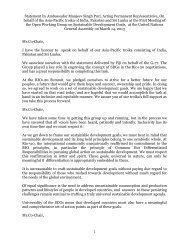STATE OF THE WORLD'S CITIES 2012/2013 Prosperity
STATE OF THE WORLD'S CITIES 2012/2013 Prosperity
STATE OF THE WORLD'S CITIES 2012/2013 Prosperity
You also want an ePaper? Increase the reach of your titles
YUMPU automatically turns print PDFs into web optimized ePapers that Google loves.
Box 3.2.3<br />
Individual versus collective interests<br />
The legal foundation of the 20th-century city lies in the<br />
ancient tenets of Roman Law and the Napoleonic Code,<br />
together with the subsequent elaboration into modern civil<br />
and common law. The gist of this legal corpus is the preeminence<br />
of the individual, who is considered as possessed<br />
of inherent rights as represented in the 18th century French<br />
Revolution’s Declaration of the Rights of Man and the Citizen.<br />
Within this individualistic legal tradition, property rights reign<br />
supreme, with the emphasis on the rights of owners to the<br />
detriment of their social implications and other, broader,<br />
collective interests, including duties and responsibilities. With<br />
particular regard to urban settings, ‘land and property are<br />
conceived largely as commodities whose economic value is<br />
determined by the owners’ interests.’ 52 In this system, the<br />
role of the State at all levels is relegated to harmonizing and<br />
mediating these interests, and to oversee those assets and<br />
facilities that require collective use.<br />
energy consumption and poor regard for the potential for<br />
agglomeration economies.<br />
TOWARDS A NEW LEGAL-URBAN ORDER FOR<br />
HOLISTIC PROSPERITy<br />
During the last two decades, the pitfalls of the conventional<br />
urban development model have become more glaring. As<br />
shown in the previous section (Urban <strong>Prosperity</strong> through<br />
Planning and Design) the potential of cities has not been<br />
fully harnessed, a more common trend has developed where<br />
urban development tends to be spatially fragmented and the<br />
benefits of prosperity remains socially segmented.<br />
In contrast, over the past two decades some Brazilian<br />
cities have taken to re-examining the prevailing urban<br />
legal order, with bold practical schemes inspired by a set<br />
of alternative, radical urban doctrines and jurisprudence<br />
which depart from the classical liberal legalism exalting<br />
individualism and private property. After a long period<br />
of consultations and<br />
negotiations, a nationwide<br />
those few<br />
City Statute was adopted<br />
FACT cities featuring in 2001 enshrining a Right<br />
balanced and<br />
to the City. The Statute<br />
sustainable prosperity<br />
makes an important<br />
have effectively<br />
contribution to urban<br />
deployed adequate<br />
laws, regulations and law, facilitating shared<br />
institutions in support of prosperity, particularly<br />
their transformation. in the context of a<br />
Innovating to Support the Transition to the City of the 21st Century<br />
117<br />
FACT<br />
Although the 20th-century city tends to exhibit fair<br />
degrees of vibrancy and dynamism, whatever attendant<br />
prosperity it experiences is often skewed and unsustainable – and<br />
therefore ridden with perennial crises.<br />
developing country. The Statute also “broke with the<br />
long-standing tradition of civil law and set the basis of<br />
a new legal-political paradigm for urban land use and<br />
development control.” 53 A prominent scholar highlights<br />
four dimensions of Brazil’s 2001 City Statute: “A<br />
conceptual one, providing elements for the interpretation<br />
of the constitutional principle of the social functions of<br />
urban property and of the city; the regulation of new<br />
instruments for the construction of a different urban order<br />
by the municipalities; the indication of processes for the<br />
democratic management of cities; and the identification<br />
of legal instruments for the comprehensive regularisation<br />
of informal settlements in private and public urban<br />
areas.” 54 This new urban legal order has had highly<br />
visible effects. As a nation and at macro-economic level,<br />
Brazil is among a handful of countries in the world that<br />
has been able to achieve remarkable growth rates for<br />
much of the early years of this century, despite the global<br />
economic turbulence. More significantly, Brazilian cities<br />
have been able to expand the middle class segments of<br />
their populations and to improve economic and living<br />
conditions for substantial numbers of poor residents.<br />
Although still very high, cities are reducing income<br />
inequalities, as measured by the Gini coefficient, which<br />
decreased from 0.606 in 1990 to 0.569 in 2009. 55<br />
REvITALIzED ‘RIGHTS TO <strong>THE</strong> COMMONS’ AND<br />
ExPANSION <strong>OF</strong> <strong>THE</strong> PUBLIC REALM<br />
‘Commons’ reinforce the social function of property and<br />
that of the city as a whole, while recognizing the dynamism<br />
of private assets. Laws, regulations and institutions as<br />
factors of restraint, opportunity and action, act as the levers<br />
that can optimize the social<br />
function of property and<br />
balance it out with private<br />
rights and assets. It must<br />
be stressed here that this<br />
social function is not about<br />
ownership rights or their<br />
transactional implications.<br />
Rather, it is essentially<br />
POLICy<br />
Shared urban<br />
prosperity<br />
is about enhancing the<br />
public realm, equitable<br />
sharing of public goods and<br />
consolidating rights to the<br />
commons for all.



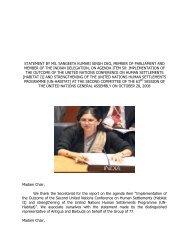
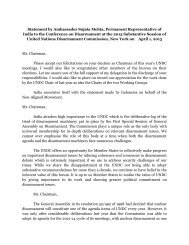
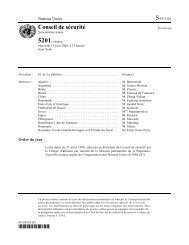
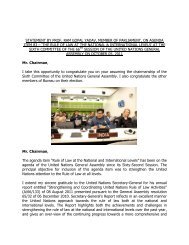
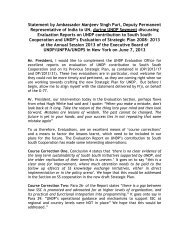
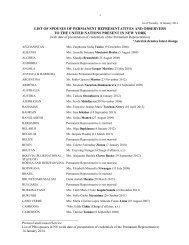

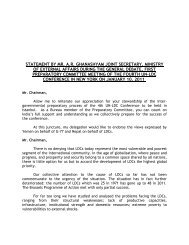
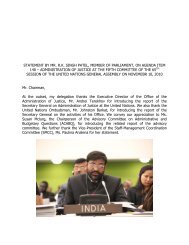
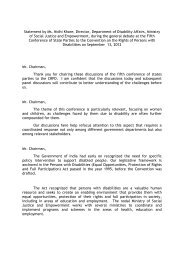
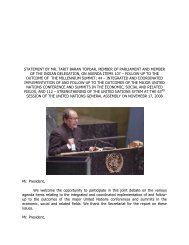
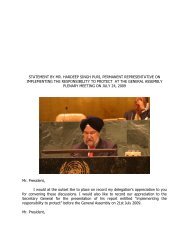
![1 statement by dr.[mrs] kakoli ghosh dastidar - Member States Portal](https://img.yumpu.com/27526598/1/190x245/1-statement-by-drmrs-kakoli-ghosh-dastidar-member-states-portal.jpg?quality=85)
